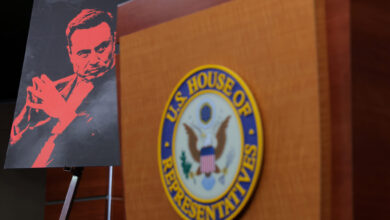Lessons from Riley Gaines on participation trophies and main character syndrome • Nevada Current

Women’s sports rarely get the respect they deserve and very few female athletes ever break through to become household names.
Stellar performances by Brittney Griner, Lisa Leslie, Sheryl Swoopes and many more have made the WNBA what it is today. But it’s not a coincidence that the arrival of Caitlin Clark, a white University of Iowa alum, has sparked a firestorm of media attention and endorsements.
So it’s unusual, to say the least, for Riley Gaines — a former college swimmer who tied for fifth place in the 200 freestyle final at the 2022 NCAA Women’s Championships — to become one of the best-known female athletes in the country.
Usually that sort of résumé would prompt another round of conservative griping about Millennials and Gen Zs being rewarded with participation trophies just for showing up — and never having to learn the tough, character-building lessons of pain, hard work and sacrifice.
Last year, North Carolina Republicans even introduced a bill that would eliminate such awards in youth sports. One of the sponsors, GOP state Sen. Bobby Hanig, told the media that “what we’re not teaching our children is to be prepared for life, be prepared for failure.
“… When kids are growing up they’re being taught it’s OK to just be OK. You don’t have to be the best,” he added.
But it’s A-OK with Republicans that Gaines isn’t the best in her sport — far from it. That’s because she’s turned her failure into a winning right-wing crusade against LGBTQ+ rights because the woman with whom she tied for fifth, University of Pennsylvania swimmer Lia Thomas, is transgender. (Again, even if Thomas were disqualified, Gaines would have only come in fourth, which doesn’t even get you on the podium).
Shortly after her loss, Gaines started popping up in statehouses across the country, advocating for bans on transgender athletes under the guise of feminism. It’s truly a bigoted solution in search of a problem. The Michigan High School Athletic Association, for instance, said in 2021 that only 10 trans athletes used the association’s transgender athlete policy in the last five years.
Having lost the battle for public opinion on LGBTQ+ rights — 71% of Americans support same-sex marriage — right-wingers have tried to peel off voters by whipping up moral panics about all-gender bathrooms and kids’ books featuring gay characters.
While Republicans have found success pushing anti-LGBTQ+ laws in red states, like Florida, Texas and Ohio, that hasn’t worked particularly well in battlegrounds. In 2022, Gaines campaigned in Michigan for GOP gubernatorial nominee Tudor Dixon, who ran on a transgender sports ban, Ron DeSantis-style “Don’t Say Gay” law and banning “pornographic” books (Dixon never provided examples, despite famously promising a reporter she’d send a list).
Dixon lost to Democratic Gov. Gretchen Whitmer by almost 11 points.
But Gaines’ career, at least, is still on a roll, as she’s hit the GOP Lincoln Dinner circuit, headlined a GOP Iowa Gov. Kim Reynolds fundraiser and was the guest of U.S. Rep. Lisa McClain (R-Bruce Twp.) at the 2023 State of the Union address. (Gaines also endorsed DeSantis for president, which worked out about as well as stumping for Dixon).
Reynolds went so far as to declare that Gaines is “fighting on the front lines of the most important women’s issue of our time” — which will come as a shock to the millions of people who voted for abortion rights measures and candidates in response to the far-right Supreme Court overturning Roe v. Wade in 2022.
But for those with a serious case of main character syndrome, Gaines must truly be an inspiration. No matter how much you might fail, no matter how insignificant the things you’re obsessed with are, as long as you have an unstoppable ego, there’s hope that you might achieve Influencer status someday.
You may have heard that Gaines popped up in Michigan again this month, this time as the commencement speaker at Adrian College, a small liberal arts school close to the Ohio border.
In announcing Gaines as the speaker, a school administrator billed the event as “offer[ing] our graduates the opportunity to broaden their understanding of world issues and inspire them as they embark on their future endeavors.”
You could make the argument that may have been achieved if Gaines did a debate or at least took questions after a speech (although I’m personally not of the belief that much is accomplished by engaging with those who don’t believe in the basic humanity of LGBTQ+ people). But the format of a commencement address is one-sided by design, so an accomplished leader can impart wisdom on the next generation. (Again, it’s hard to see how a fifth-place college swimmer fits the bill).
It seems clear that college officials didn’t think it was worth considering how LGBTQ+ students or family members would feel being forced to endure hateful propaganda on what should be a joyous day for all. As a bisexual woman with two kids who are proud members of the LGBTQ+ community, I can say I wouldn’t have wanted to subject my family to that.
And several alumni did speak out.
“She [Gaines] has no message to deliver other than she hates trans people. That’s her message,” Leann McKee, who is trans and a 1984 Adrian College graduate, told the Advance.
But in inviting Gaines, Adrian’s controversy-courting president seemed to get the reaction he was looking for, just like having former Gov. Rick Snyder speak at the 2017 graduation only a year after the Flint water crisis became an international news story.
Maybe the only upside of this sorry episode is that Gaines upstaged “Wheel of Fortune” host Pat Sajak, who delivered the commencement address up the road at conservative Hillsdale College, where he chairs the board. It seems that being a TV fixture since Ronald Reagan was president can’t really compete with Gaines’ brand of Instagrammable victimhood.
This column was originally published in Michigan Advance, which like Nevada Current is part of States Newsroom, a nonprofit news network supported by grants and a coalition of donors as a 501c(3) public charity.




